Poetry
Poetry


Mural
Last poems from the national poet of Palestine.
Mural is the testimony of one of the most important and powerful poets of our age.
Mahmoud Darwish was the unofficial laureate of Palestine. One of the greatest poets of the last half-century, his work evokes the loss of his homeland and is suffused with the pain of dispossession and exile. Here, his close friends John Berger and Rema Hammami present a beautiful new translation of two of Darwish’s later works: his long masterpiece Mural, a contemplation of his life and work written following life-threatening surgery, and his last poem, The Dice Player, which Darwish read in Ramallah a month before his death.
Illustrated with original drawings by John Berger.
Introduction by John Berger
Translated by John Berger and Rema Hammami

A Working Life (paperback)
The first new collection since Evolution from the prolific poet, activist, and writer Eileen Myles, a “Working Life” unerringly captures the measure of life. Whether alone or in relationship, on city sidewalks or in the country, their lyrics always engage with permanence and mortality, danger and safety, fear and wonder.
a “Working Life” is a book transfixed by the everyday: the “sweet accumulation” of birds outside a window, a cup of coffee and a slice of pizza, a lover’s foot on the bed. These poems arise in the close quarters of air travel, the flashing of a landscape through a train window, or simply in a truck tooling around town, or on foot with a dog in all the places that held us during the pandemic lockdowns. Myles’s lines unabashedly sing the happy contradictions of love and sex, spill over with warnings about the not-so future world threatened by climate change and capitalism, and also find transcendent wonder in the landscapes and animals around us, and in the solitary and collective act of caring for one another and our world.

Meditations
A manual of meditations on grief blocked by trauma, pliers, goats, remedies, meaning, conduits, suicide, eggs, times, tutting, God, lifts, treasury tags, wrecking yards, Douglas Barrowman, involuntary spasms, front desks, manganese deficiency, weevil shit, Mr Sheen, coal potential, the bison, The Final Cut, tone of voice, trillions of cicadas, Elisabeth Koolaart-Hoofman, bogus antler cannibalism, the Preces Gertrudianae, parodies of communication, “Cary Grant’s Wedding,” the corruption of youth, a tripod or cable, Culverwell on the Vacuola, geese, Hemans’s line on Mary Tighe, annihilation, the proletariat, plastic bags, La Compiuta Donzella di Firenze, poetry, rooms, beheadings, S106 obligations, and planks. Containing single, double, triple, and sextuple sestinas, in the old mode of retrogradatio cruciata, and other canzoni, crushed to prose.

Ad Học
Teline Trần's Ad Học traverses the improvisational structures that shape social life in order to reflect their valences as both insufficient and abundant. In their first poetry chapbook, Trần locates those junctures with bittersweet pleasure and biting critique and asks how to sustain both at once. This is, Trần shows us, the work of living, against and within the ongoing attrition and amnesia at scales historical and governmental, interpersonal, familial, and social. Ad Học asks the reader to turn inwards, towards a personal politic, to self-revolution, in order to seek horizons dreamier, queerer, and hopefully insurgent.
Teline Trần is a writer from Orange, California or Gabrieleño/Tongva land. They write about home and interstitial faith via several mediums such as fiction, poetry, film, and ultimately, the browser. Teline works as the Membership and Community Engagement Coordinator at Wendy’s Subway, where they were a Fellow in 2020. They also work as the Development Coordinator at Mekong NYC, a Southeast Asian grassroots organization in the Bronx. They hold a degree in Comparative Literature from Reed College.

Death Styles
In this follow-up to her award-winning collection, Toxicon and Arachne, Joyelle McSweeney proposes a link between style and survival, even in the gravest of circumstances. Setting herself the task of writing a poem a day and accepting a single icon as her starting point, however unlikely—River Phoenix, Mary Magdalene, a backyard skunk—McSweeney follows each inspiration to the point of exhaustion and makes it through each difficult day. In frank, mesmeric lyrics, Death Styles navigates the opposing forces of survival and grief, finding a way to press against death’s interface, to step the wrong way out of the grave.
A recipient of a 2022 Guggenheim Fellowship for Poetry, Joyelle McSweeney’s published works span poetry, prose, drama, translation, and criticism. Her debut volume The Red Bird (2001) inaugurated the Fence Modern Poets Series; her verse play Dead Youth, or the Leaks (2012) inaugurated the Leslie Scalapino Prize for Innovative Women Playwrights; and her most recent double-collection, her co-translation with Jack Jung, Don Mee Choi, and Sawako Nakayasu of Yi Sang’s Selected Works received numerous recognitions, including the 2021 MLA Aldo and Jeanne Scaglione Prize for a Translation of Literary Work. Her influential volume The Necropastoral: Poetry, Media, Occults (2014) counters conventional ecopoetics by locating aesthetic and political possibility in such signature Anthropocene phenomena as mutation, contagion, contamination, and decay. McSweeney is a Professor of English at the University of Notre Dame.

The Beauty of the Husband: A Fictional Essay in 29 Tangos
The Beauty Of The Husband is an essay on Keats’s idea that beauty is truth, and is also the story of a marriage. It is told in 29 tangos. A tango (like a marriage) is something you have to dance to the end.
This clear-eyed, brutal, moving, darkly funny book tells a single story in an immediate, accessible voice–29 “tangos” of narrative verse that take us vividly through erotic, painful, and heartbreaking scenes from a long-time marriage that falls apart. Only award-winning poet Anne Carson could create a work that takes on the oldest of lyrical subjects–love–and make it this powerful, this fresh, this devastating.

A Very Large Array: Selected Poems
Osman's writing reinvents poetry as an instrument for dissecting vision, language and power
This extensive collection of poet Jena Osman's acclaimed work spans more than 30 years, gathering poems from journals and books long out of print. Her poetry traces overlooked visual and linguistic incidents across centuries of American history, transforming "official" language—from Supreme Court opinions to the chatter of Predator drone pilots—into writing that is comic, chilling and relentlessly inventive.
Jena Osman's (born 1963) books include Motion Studies (Ugly Duckling Presse, 2019), Public Figures (Wesleyan University Press, 2012), The Network (Fence Books, 2010, selected for the National Poetry Series in 2009), An Essay in Asterisks (Roof Books, 2004) and The Character (Beacon Press, winner of the 1998 Barnard New Women Poets Prize). She lives in Philadelphia.

Hot Wings and Tenders
Hot wings and tenders est un recueil de poèmes bilingue anglais/français qui décline l'exploration d'une jeune femme queer de son corps, sa sexualité, et ses modalités d'existence matérielles. Alternativement tendres, crus, drôles et vifs, les poèmes de Marl Brun utilisent des protocoles d'écriture en apparence mathématiques pour tenter de capturer l'absurde logique du monde. Ils sont les énoncés analytiques d'une intimité qui demeure sensible et échappe à toute tentative de rationalisation.
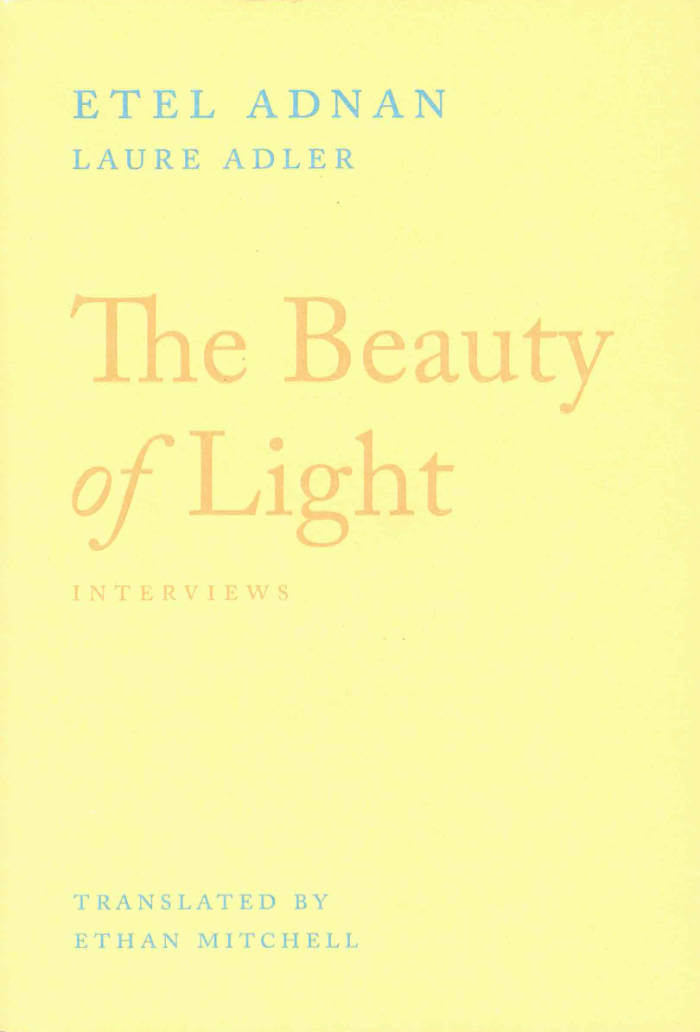
The Beauty of Light: An Interview
A lively and spontaneous interview with Etel Adnan about her absolute belief in the beauty of the world, the beauty of art.
In these interviews conducted by journalist Laure Adler, poet and painter Etel Adnan recounts the foundational experiences of her artistic approach shortly before her death in Autumn of 2021. From her youth in Lebanon, through her years in New York and California, and her late-in-life discovery at Documenta in 2013, this intimate conversation revisits and questions the sometimes difficult destiny of women.

The Original 1939 Notebook of a Return to the Native Land: Bilingual Edition
The first bilingual edition of this radically original work.
Aimé Césaire's masterpiece, Notebook of a Return to the Native Land, is a work of immense cultural significance and beauty. This long poem was the beginning of Césaire's quest for négritude, and it became an anthem of Blacks around the world. Commentary on Césaire's work has often focused on its Cold War and anticolonialist rhetoric—material that Césaire only added in 1956. The original 1939 version of the poem, given here in French, and in its first English translation, reveals a work that is both spiritual and cultural in structure, tone, and thrust. This Wesleyan edition includes the original illustrations by Wifredo Lam, and an introduction, notes, and chronology by A. James Arnold.

Pier Paolo Pasolini: Writing on Burning Paper
Annabel Brady-Brown, Giovanni Marchini Camia
Published on the centenary year of Pasolini’s birth, Pier Paolo Pasolini: Writing on Burning Paper is a dual edition that stages a dialogue between cinema today and Pasolini’s timeless films and words.
The two complementary volumes slide into one another, forming a unique set that evokes and celebrates Pasolini’s enduring influence. The smaller book features his epic autobiographical poem ‘Poet of the Ashes’, in a revised translation by esteemed poet Stephen Sartarelli; the larger book comprises original tributes by vital filmmakers from across the contemporary cinema landscape.
Twenty filmmakers shared personal reflections in the form of essays, poems, photographs, drawings and more: Catherine Breillat, Luise Donschen & Helena Wittmann, Jia Zhangke, Radu Jude, Payal Kapadia, Alexandre Koberidze, Dane Komljen, Mike Leigh, Mariano Llinás, Roberto Minervini, Valérie Massadian, Luc Moullet, Ben Rivers, Angela Schanelec, Ulrich Seidl, Basma al-Sharif, Deborah Stratman, Anocha Suwichakornpong and Gustavo Vinagre.
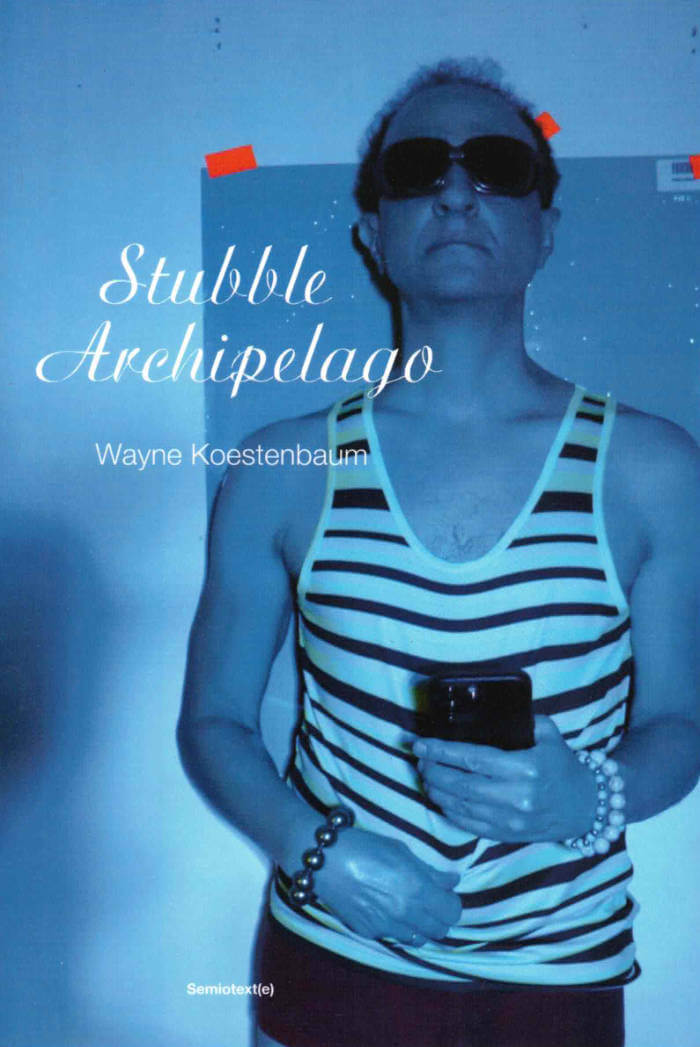
Stubble Archipelago
Wild new adventures in word-infatuated flânerie from a celebrated literary provocateur.
This book of thirty-six poetic bulletins by the humiliation-advice-giver Wayne Koestenbaum will teach you how to cruise, how to dream, how to decode a crowded consciousness, how to find nuggets of satisfaction in unaccustomed corners, and how to sew a language glove roomy enough to contain materials gathered while meandering.
Koestenbaum wrote many of these poems while walking around New York City. He'd jot down phrases in a notebook or dictate them into his phone. At home, he'd incorporate these fragmented gleanings into overflowing quasi sonnets. Therefore each poem functions as a coded diary entry, including specific references to sidewalk events and peripatetic perceptions. Flirting, remembering, eavesdropping, gazing, squeezing, sequestering: Koestenbaum invents a novel way to cram dirty liberty into the tight yet commodious space of the sonnet, a fourteen-lined cruise ship that contains ample suites for behavior modification, libidinal experiment, aura-filled memory orgies, psychedelic Bildungsromane, lap dissolves, archival plunges, and other mental saunterings that conjure the unlikely marriage of Kenneth Anger and Marianne Moore. Carnal pudding, anyone? These engorged lyrics don't rhyme; and though each builds on a carapace of fourteen lines, many of the lines spawn additional, indented tributaries, like hoop earrings dangling from the stanzas' lobes.
Koestenbaum's poems are comic, ribald, compressed, symphonic. They take liberties with ordinary language, and open up new pockets for sensation in the sorrowing overcoat of the “now.” Imagine: the training wheels have been removed from poetry's bicycle, and the wheeling flâneur is finally allowed a word pie equal to fantasy's appetite. Stubble—a libidinal detail—matters when you're stranded on the archipelago of your most unsanctioned yet tenaciously harbored impulses.
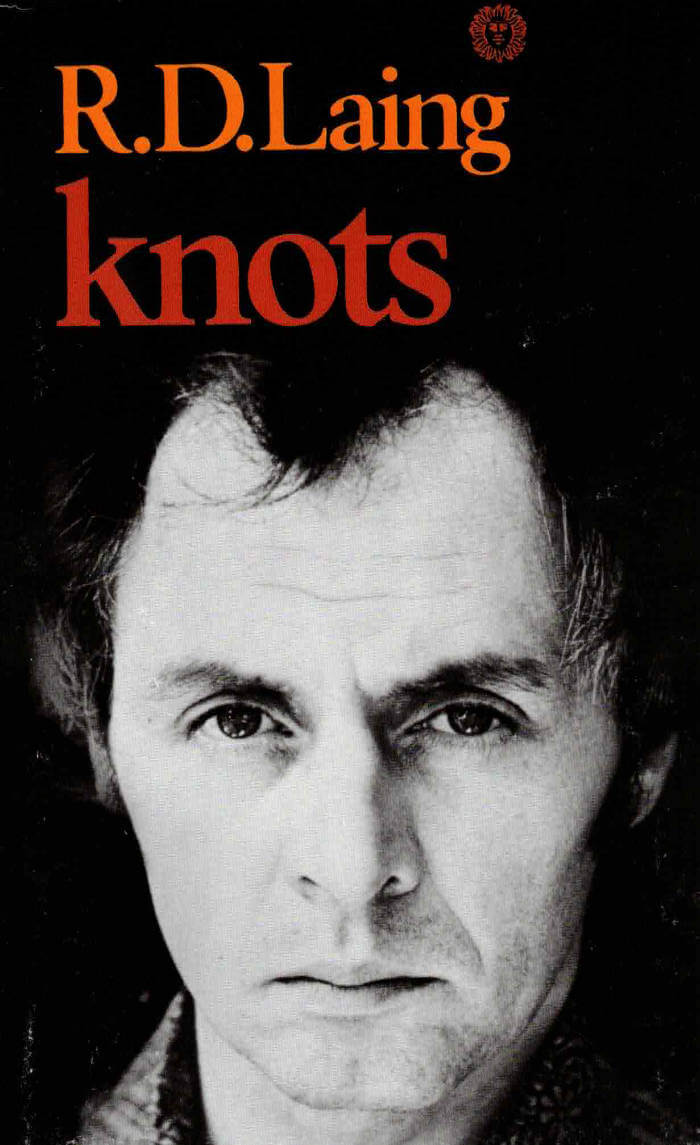
Knots
Originally published in 1970, Knots consists of a series of dialogue-scenarios that can be read as poems or brief plays, each complete in itself. Each chapter describes a different kind of the "knots" of the bonds of love, dependency, uncertainty, jealousy. The dialogues could be those between lovers, between parents and children, between analysts and patients or all of these merged together. Each brilliantly demonstrates Laing's insights into the intricacies of human relationships.

Things You May Find Hidden in My Ear: Poems from Gaza
Winner of the 2022 Palestine Book Awards Creative Award
Finalist for the National Book Critics Circle Award in Poetry
These poems emerge directly from the experience of growing up and living one’s entire life in Gaza, making a life for one’s family and raising a family in constant lockdown, and often under direct attack.
In this poetry debut, conceived during the Israeli bombing campaign of May 2021, Mosab Abu Toha writes about his life under siege, first as a child, and then as a young father. A survivor of four brutal military attacks, he bears witness to a grinding cycle of destruction and assault, and yet, his poetry is inspired by a profoundly universal humanity.
In direct, vivid language, Abu Toha tells of being wounded by shrapnel at the age of 16 and, a few years later, watching his home and his university get hit by IDF warplanes in a bombing campaign that killed two of his closest friends. These poems are filled with rubble and the ever-present menace of surveillance drones policing a people unwelcome in their own land, and they are also suffused with the smell of tea, roses in bloom, and the view of the sea at sunset. Children are born, families continue traditions, students attend university, and libraries rise from the ruins as Palestinians go on about their lives, creating beauty and finding new ways to survive.
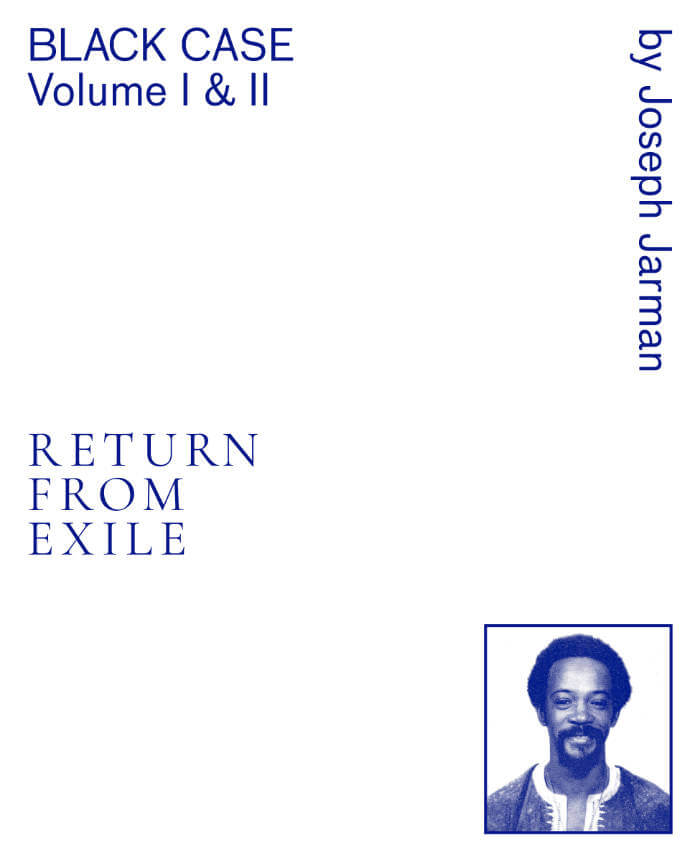
Black Case Volume I and II – Return From Exile
The republication in print form of the poems of Art Ensemble of Chicago's founding member breathes new life into a forgotten document of the Black Arts Movement.
In 1977, Art Ensemble of Chicago Publishing Co. published Jarman's Black Case Volume I and II: Return From Exile, a collection of writing conceived across America and Europe between 1960 and 1975. Comprised largely of Jarman's flowing, fiery free verse—influenced by Amus Mor, Henry Dumas, Thulani Davis, and Amiri Baraka—the book also features a manifesto for “GREAT BLACK MUSIC,” notated songs, concert program notes, Jarman's photos, and impressions of a play by Muhal Richard Abrams, the founder of the Association for the Advancement of Creative Musicians of which Jarman was also an original member.
Jarman writes poetry of personal revolutionary intent, aimed at routing his audience's consciousness towards growth and communication. He speaks with compassionate urgency of the struggles of growing up on Chicago's South Side, of racist police brutality and profound urban alienation, and of the responsibility he feels as a creative artist to nurture beauty and community through the heliocentric music that he considers the healing force of the universe. A practicing Buddhist and proponent of Aikido since a 1958 awakening saved him from the traumatic mental isolation of his time dropped by the US army into southeast Asia, Jarman sings praise for the self-awareness realization possible through the martial arts.
With cosmic breath as its leitmotif, his poetry both encourages and embodies a complete relinquishing of ego. While some of the poems contained within Black Case have already been immortalized via performances on classic records by Jarman and Art Ensemble of Chicago, its republication in print form breathes new life into a forgotten document of the Black Arts Movement.

Gardener's Arms
Prose poetry looking at sonic energies, technologies, emotions and the body. Attuned to atmospheres and spaces between each other as well as the nervy dissonance between everyday speech and compositions on the page. The writing was in part developed during a sound art residency at Q-02, Brussels, Belgium.
Heavy footed, peeping
you are shadow and stone dial both
something given away reveals itself as an experiment into growth
& the doughy apology of a reversal

DEARS No. 3 RE.SONATE
Robert Steinberger, Delphine Chapuis Schmitz and 1 more
DEARS is a print magazine for transversal writing practices at the crossroads of art, poetry and experimental writing. It brings together authors and writers from different backgrounds and constitutes a dedicated platform for texts escaping the usual genres and disciplinary boundaries.
DEARS promotes the exploration of new forms of language as a way to foster new forms of living together, and emphasizes the growing relevance of trans- versal writing practices in this respect.
Issue no. 3 / Winter 2021 / RE.SONATE
With texts by Meloe Gennai, Livia Johann & Anne Sylvie Henchoz, Rahel Kraft, Sanna Marander, Dominic Oppliger, Dominique Petitgand, Sarah Riggs, Cia Rinne, Axelle Stiefel & Sanna Helena Berger, Niklas Tafra, Salomé Voegelin and an epigraph by Frantz Loriot.
Editors are Delphine Chapuis Schmitz, Nicole Bachmann and Robert Steinberger

Poësy Matters and Other Matters (2 vol.)
The first comprehensive publication of the Swedish polymath Catherine Christer Hennix's written work in a two-volume set.
Volume one, Poësy Matters, is divided into two sections: poetry and drama, with each section also containing pieces of commentary by Hennix or her longtime collaborator Henry Flynt. Volume two, Other Matters, is divided into two sections: first, program notes and essays about a wide range of topics (including music, psychoanalysis, and mathematics), and second, a reproduction of Hennix's 1989 work The Yellow Book. The first comprehensive publication of Hennix's written work, Poësy Matters and Other Matters illustrates the singular depth and variety of her contributions to contemporary music, art, literature, and mathematics.
The texts in Poësy Matters and Other Matters reflect Hennix's diverse training as well as her long-standing personal interests in Lacanian psychoanalysis and Japanese and Middle Eastern poetic forms, resulting in a rich, diffuse collection of writings that reveal one of the avant-garde's most implacable, not to mention overlooked, creative minds.
Best known as a composer, Catherine Christer Hennix (1948, Stockholm – 2023, Istanbul) has, throughout her fifty-plus-year career, produced innovative work in the fields of not just minimal and computer music, but psychoanalytic theory, intuitionist mathematics, poetry, and prose as well.
Edited and introduced by Lawrence Kumpf.
English edition
17 x 24 cm (2 individual books, packaged together)
311 + 448 pages (ill.)

Joan of Arkansas
Joan of Arkansas is an election-season closet drama about climate catastrophe, divine gender expression, the instructions of angels, and heavenly revelation relayed via viral video. Fifteen-year-old Joan has been tasked by God (They/Them) to ensure that Charles VII (R–Arkansas) adopts radical climate policy and wins his bid as the Lord’s candidate to become the president of the United States. Arkansas is flooding, the West is burning, and borders are closed: “Heaven or / internet—it’s / hard to be / good.”
Winner of the 2023 Whiting Award for Drama.
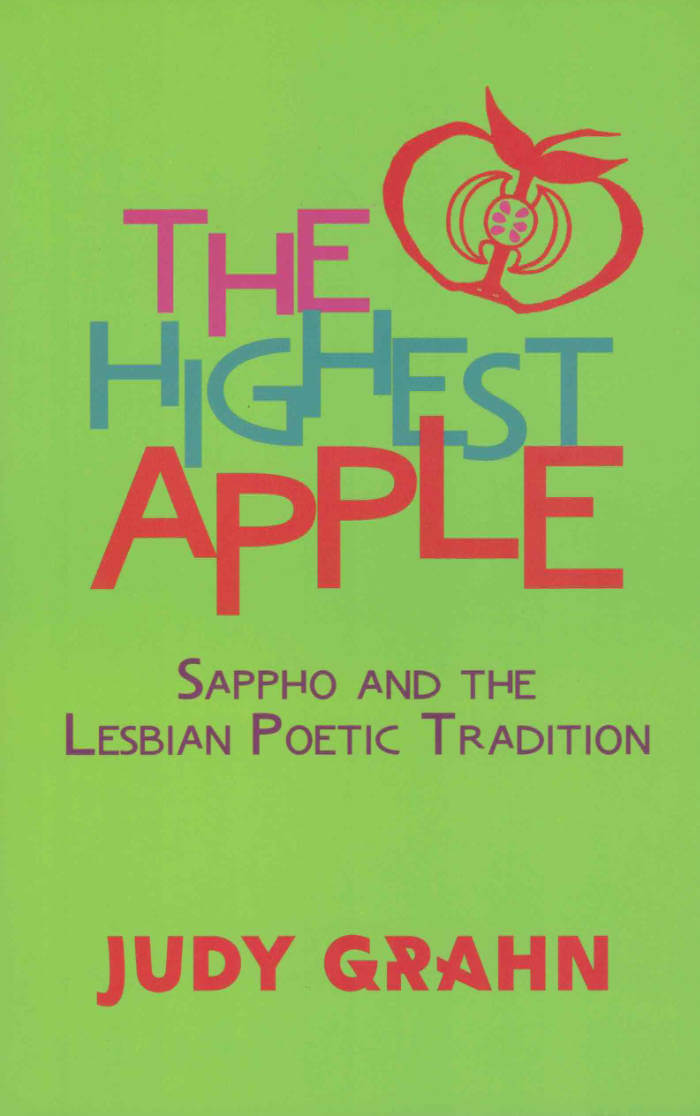
The Highest Apple: Sappho and the Lesbian Poetic Tradition
In 1985, Judy Grahn boldly declared that lesbians have a poetic tradition and mapped it from Sappho to the present day in the groundbreaking book, The Highest Apple. In this new and updated edition of The Highest Apple: Sappho and the Lesbian Poetic Tradition, Grahn revisits the original text with her characteristic ferocious intellect, passion for historical research, careful close readings, and dynamic storytelling. Grahn situates poetry by Sappho, Emily Dickinson, Amy Lowell, H.D., Gertrude Stein, Adrienne Rich Paula Gunn Allen, Audre Lorde, Pat Parker, and Olga Broumas as central to lesbian culture—and more radically as central to society as a whole.
This new edition of The Highest Apple: Sappho and the Lesbian Poetic Tradition includes Grahn’s in depth analysis of poetic work by her friend and comrade Pat Parker and suggests a transactional approach to poetry as uncovering layers of the self. Grahn assembled this text in conversation with two younger lesbian poets, Alicia Mountain and Alyse Knorr, demonstrating the continued relevance and dynamism of The Highest Apple for contemporary readers. A new introduction by Grahn, a foreword by Alyse Knorr, and editor notes by Alicia Mountain along with six responses by contemporary poets Donika Kelly, Kim Shuck, Serena Chopra, Zoe Tuck, Saretta Morgan, and Khadijah Queen highlight the on-going significance of The Highest Apple to readers, writers, and thinkers.
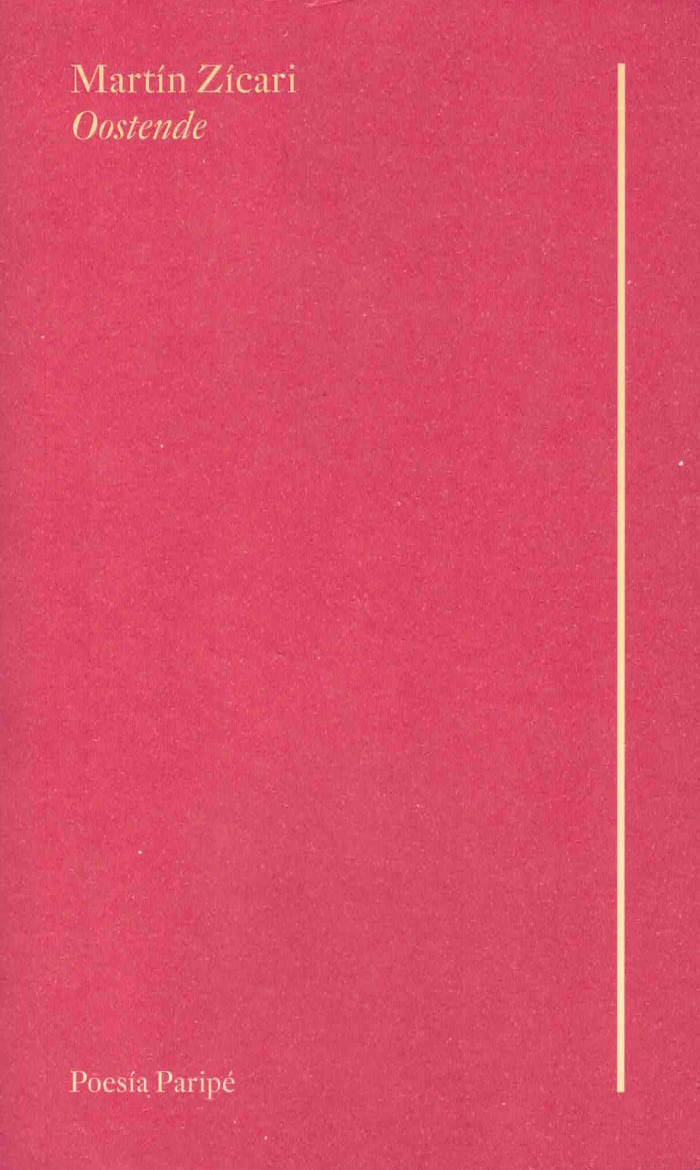
Oostende
Oostende is a book about displacement and the sometimes-overwhelming internal monologue we live with. In between poetry, diary and novel, the book reflects on Zicari’s life in Buenos Aires and Belgium, as he navigates work fragility, friendship, sex and love, migration and the fiction laying behind everyday actions and life changing decisions.
Zícari's portrayal of his private life is far from the domain of the concrete, instead he ventures into the uncontrollable production of fantasies that sustain his inner discourse. It is around this dichotomy between the real and the imaginary, the tension between the experienced and the illusion, that Martín Zícari builds a book sustained in orality and proximity.
Martín Zícari, PhD, is a writer and producer based in Brussels. He has published poetry collections such as "Oostende" (Paripé Books, Madrid, 2023), "Del Príncipe Azul al Hombre Invisible en una Semana" (Editorial Municipal de Rosario, Argentina, 2018), and "Pequellpu" (LUMA Foundation, Switzerland, 2015), as well as the short novel "Scalabritney" (Entropia, Argentina, 2014), among others. His research has been featured in scientific journals such as Performance Research, Memory Studies, and the Journal of Latin American Cultural Studies.

Martin Wong: Footprints, Poems, and Leaves
Self-published in 1968, Footprints, Poems, and Leaves collects dozens of poems written by Martin Wong between 1966 and 1968. Hand-written in a signature calligraphic style that he was just beginning to develop, the poems ebb and flow visually across the page, much like the fluctuating characters, scenes, and moods that inhabit them. This was Wong’s first book of poetry and it contains a double cover showcasing intricate drawings of skeletal angels and other tableaux, as well as a folded, looseleaf broadsheet containing two poems and a drawing of a boney leaf.
The poems were written during a relatively free period for the artist, shortly after he dropped out of Berkeley and began exploring San Francisco at the height of the hippy movement. The poems range from surrealist and pastoral descriptions of the urban subculture that surrounded him to downtrodden, travel-weary biographical entries that are both lonely and tender. Footprints, Poems, and Leaves functions like a journal capturing Wong’s tumultuous life in this period, which included being arrested at a queer, drug-fueled house party (along with Rudolf Nureyev and Dame Margot Fonteyn) and a stay in a mental institution in late 1967 and early 1968. Around the time of the book’s publication, Wong enrolled in Humboldt State University to finish his degree, beginning a new chapter for the artist.
Despite the dark backdrops of many of the works, the writing displays a playfulness with form and language and a sense of humor that can be seen throughout Wong’s later work as well. Altogether, Footprints, Poems, and Leaves creates a rich tapestry of visual poetry that is both a product of its time and the budding artistic mind of a young Martin Wong.

Wrong Norma
Published here in a stunning edition with images created by Carson, several of the twenty-five startling poetic prose pieces have appeared in magazines and journals like The New Yorker and The Paris Review.
As Carson writes: “Wrong Norma is a collection of writings about different things, like Joseph Conrad, Guantánamo, Flaubert, snow, poverty, Roget’s Thesaurus, my Dad, Saturday night. The pieces are not linked. That’s why I’ve called them ‘wrong.’”